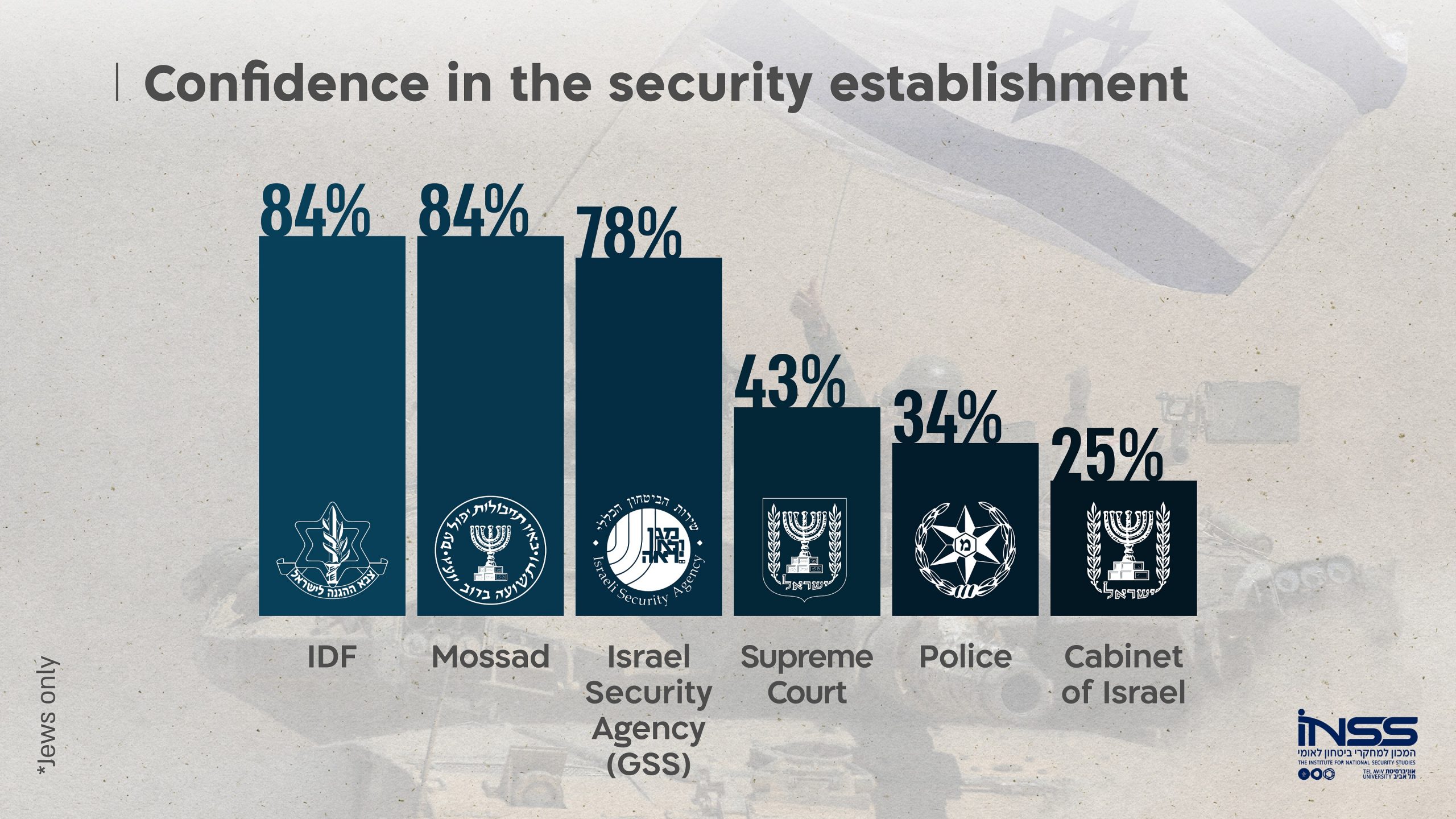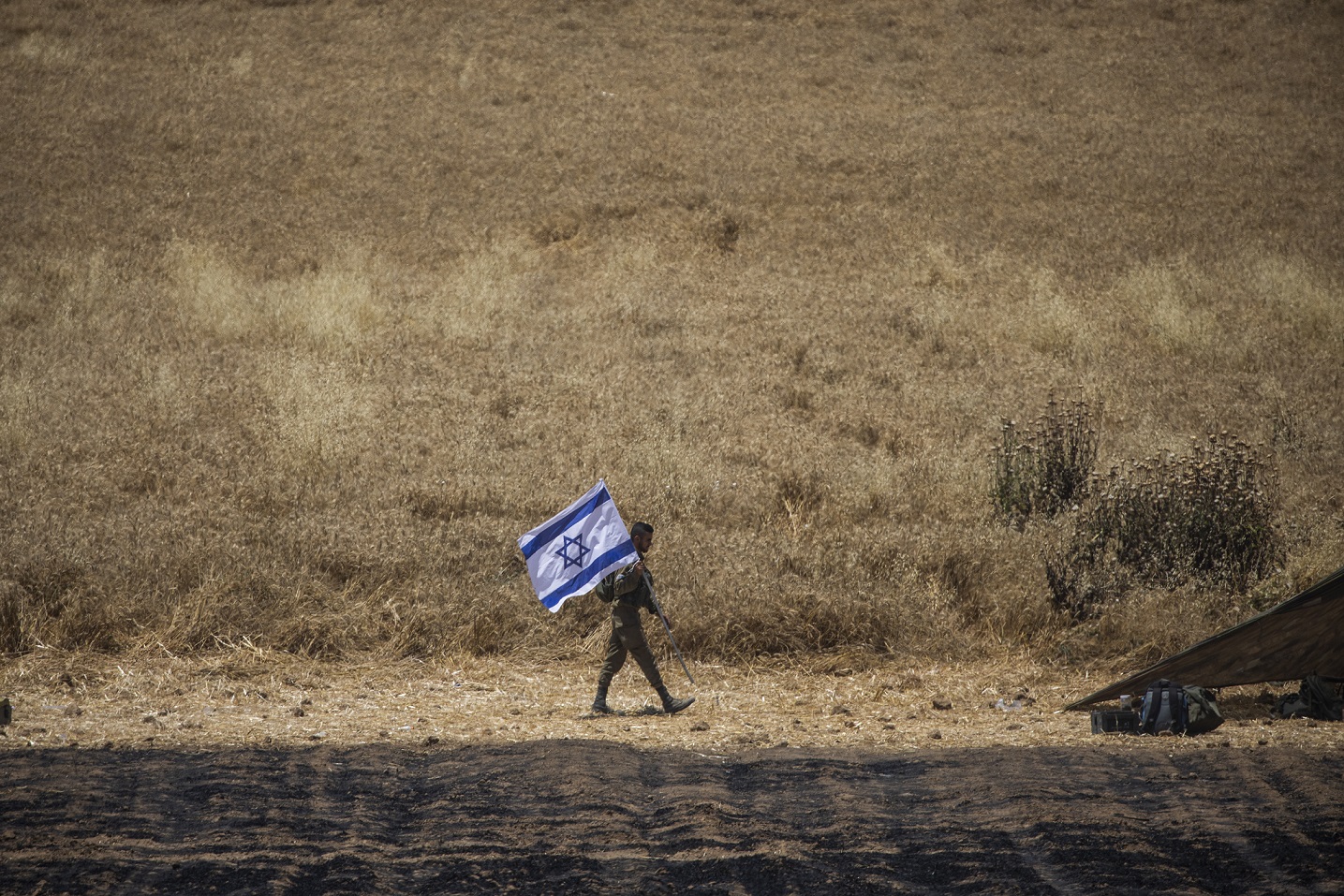Publications
INSS Insight No. 1523, October 6, 2021
Public confidence in the IDF is a central social-national asset that enables the military to enlist support, resources, and quality manpower, particularly when civilian needs become prominent and threaten its seniority as a public system. Several recent events may reflect growing gaps between the public’s attitudes regarding how the IDF is managed and how the army presents itself. These events may hint at the decline in the level of confidence in the army on the part of the public and some of those serving in it, and also raise doubts regarding the awareness – or lack thereof – of the IDF’s commanders regarding the importance inherent in the relationship with Israeli society. With requisite confidence, modesty, and transparency, the IDF should take the initiative toward reducing the gap, in order to demonstrate to the public that it is still the army of the people, for the people.
Several recent significant developments on a range of issues could have negative implications for relations between the IDF and Israeli society. Perhaps the most disconcerting among them is the severe reaction by parts of the Israeli public to the circumstances regarding the death of Border Police combat soldier Barel Hadaria Shmueli on the border with the Gaza Strip. As with other incidents, this event was accompanied by serious accusations against the IDF and expressions of a lack of confidence in the army and its commanders. It was also exploited by opposition politicians to criticize the army and the government, which were accused of tying the soldiers’ hands in order to maintain the coalition with Ra’am. The senior command had difficulty presenting a convincing timely systematic response to these claims, and lagged behind the stream of related media events and the social media uproar.
Previously, the IDF faced serious criticism, mainly on the part of commentators in the financial and social media, due to a series of unusual budgetary demands in the state budget presented in the Knesset. There was particular anger over the retroactive institution of pension benefits for retired officers ("the Chief of Staff's increases"), whose legality is currently under examination by the Supreme Court. These demands by the army, which were backed by Defense Minister Benny Gantz, were regarded as insisting on excessive benefits for IDF retirees and thereby reflecting insufficient sensitivity to other groups in Israeli society, especially those affected by the COVID-19 crisis. The significant increase in the defense budget during this economically challenging period, in circumstances of across-the-board budget cuts to government ministries, raised eyebrows and invited disapproval. The National Security Index of June 2021, a public opinion study by the Institute for National Security Studies (INSS), clearly indicates that the majority of the public (59 percent) prefer to invest resources primarily in socioeconomic issues, even at the expense of the security budget.
In addition, the cancellation of the decision to shorten mandatory military service by two months, an issue in which there is little public interest, provoked criticism. At issue are the waste involved in the long service of less essential soldiers and following the IDF's disregard for the law legislated by the Knesset five years ago: instead of abiding by the law mandating the shorter service, the IDF waited for a political opportunity to cancel it and until then continued to relate to new recruits as intended to serve the entire period.
The fourth and perhaps most important development is the deep gap between the IDF’s marketing of Operation Guardian of the Walls against Hamas in the Gaza Strip last May as a major success and what is perceived as very limited results in the operational and strategic realms. This gap is reflected in various polls conducted soon after the end of the operation; only about 22-28 percent believed that Israel had won. A similar picture emerges from polls conducted following Operation Protective Edge (2014) and the Second Lebanon War (2006).
These events have a common denominator: taken individually and together, they may reflect growing gaps between public attitudes regarding how the IDF is managed, and the ways the army perceives or presents itself. Moreover, they can to raise doubts regarding the awareness by IDF commanders regarding the importance inherent in the relationship between the IDF and Israeli society. Maintaining the IDF's symbolic standing as "the people's army" despite the shrinking rate of public enlistment is the main basis for its social legitimacy.
The public's confidence in the IDF, especially when it comes to the use of force and its success in operational activity, is a key component of its strength. It enables the army not only to achieve public support for the allocation of the enormous resources it needs and for the way it applies its force, but also for recruiting talented youth into its ranks and training them under demanding conditions, even for risking their lives. In the social-cultural circumstances that exist in Israel, the IDF must also rely on the willingness of candidates for mandatory service to join its ranks and volunteer for combat units, and can no longer rely only on the mandatory conscription law, or on the basic willingness that still exists to serve out of the enlisting soldiers' sense of the benefit of service for them. This is also the case among reservists, who in effect volunteer to serve. It is therefore important to maintain the public awareness that the IDF relies on a broad and diverse base of groups in society that enables it to position itself as the people's army.
In this context, there is growing importance to the professional stratification between different groups of people serving in the IDF, which to a large extent reproduces and over time even increases social stratification in Israel. This phenomenon contributes to a sense of frustration among soldiers in field units, especially regarding incidents of violent tension with the Palestinian population, such as with the death of Shmueli. This frustration could lead to social unrest that would expose the IDF to civilian criticism that could take on a charged political character.
The majority of surveys conducted inside and outside the IDF reflect an encouraging overall picture: the IDF as a fighting organization still receives high levels of public confidence and support (with variations that are not significant), with over 82 percent support among the Jewish public. Even if there has been a slight decline in the public's confidence in the IDF as a public institution in recent years (from 93 percent in 2019), it still leaves the army far ahead of other institutions, where there is a dramatic decline in public confidence. However, in measuring the public's confidence in the IDF it is necessary to distinguish between general confidence, which still remains high, and confidence in the army as a public institution – an area in which, according to surveys by civilian and military analysts, there has been a decline in the level of confidence.
Presumably the high level of confidence in the IDF among the Jewish population lies mainly in the cognitive link between the public’s basic concern for its existence, due to security risks, and its view of IDF as the main defender of the existence of the State of Israel, the Jewish people, and the citizens of Israel. However, the high level of public confidence in the IDF is not guaranteed in the future, as polls conducted recently in the context of the COVID-19 crisis have indicated the higher importance that the public attributes to civilian risks than to security risks. The June 2021 National Security Index shows that the majority of the public was significantly more concerned about internal threats than external-defense threats. In fact, only a tiny minority (5 percent) stated that they were more concerned about security threats.

While the measurement is carried out mainly through public opinion polls, perhaps more important are signs that could indicate erosion or cast doubt on the credibility of the IDF command among those serving in it, and especially among the junior command and reservists, and among those who are meant to enlist. An increasing portion of the latter are looking for various ways to avoid enlistment (for example through exemptions for "psychological reasons") and receive backing for this from their social environment.
What can be done in order to strengthen the public's confidence in the IDF?
- The IDF should see public confidence as a central and vital resource, see itself as responsible for maintaining this confidence and as leading the public relations effort on this issue vis-à-vis Israeli society.
- Therefore, the IDF should emphasize not only operational achievements and skills, but also the fact that it is attentive and sensitive to Israeli society, and recognize the fact that the resources that it receives from society – first and foremost the human resources – cannot be taken for granted.
- The IDF always operates within the framework of a challenging political environment and constraints, all the more so during a period of political instability such as the current period. The only way to cope with them successfully is to project – especially through the personal example of commanders – responsibility, modesty, and a dignified, credible, and accurate discourse.
- The IDF needs to adopt a maximally open, professional, and transparent approach toward the public regarding its activities. The only limitation should be information security. The public should be more exposed to information on the IDF’s ongoing activity, on the IDF's operational doctrine, and its military buildup, including the army's policy in the sensitive area of human resource management.
- The IDF should build and present an up-to-date plan for developing its human resources in the long term, on a differential basis that recognizes the changing needs of the army and prioritizes and clearly compensates the groups that are vital to its operational activity. It should do this while working to reduce the expanding social gaps between soldiers who serve in combat units (some of whom are in constant friction with the Palestinian civilian population) and soldiers who serve in the advanced systems of intelligence and technology.
- The IDF must show that it knows how to operate flexibly and reexamine rigid models of conduct in all sectors of service. For example, the IDF can examine and propose, preferably soon, ways to transfer existing resources in order to strengthen its ability to retain soldiers and officers in essential roles, including at the expense of somewhat reducing existing pension arrangements.
Implementing such proposals will be more imperative as time goes on, especially if and when the intensity of external military threats declines and the intensity of internal civilian threats grows. These proposals can address the concern that the public criticism of the IDF's management and conduct in social-ethical fields will increase and even spill over into a significant decline in confidence in the institution.



